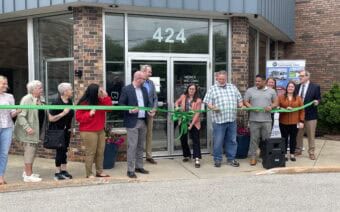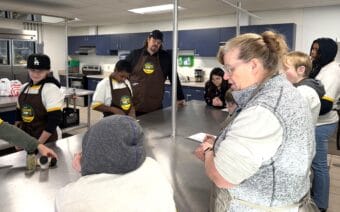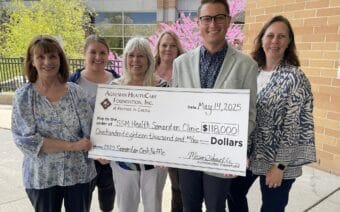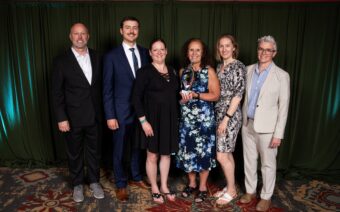
August 12, 2024
FOND DU LAC – If you asked Dyson Nunn – a registered charge nurse in the Emergency Department at SSM Health St. Agnes Hospital in Fond du Lac – about his 18 years in the U.S. military, he would tell you, “I was just doing my job.”
The retired combat medic specialist was recently honored for that service as “Hero of the Game” at a Milwaukee Brewers game – a recognition Nunn said meant more to him than he could ever explain.
“There are medics 10 times better than me,” he said. “There are soldiers 10 times better than me, who did way more than me, and I don’t know if they’ll ever get an opportunity to be on that dugout being honored. I am humbled, appreciative and love everybody – but like I said, I just did my job.”
His service
Nunn said he would be the first to admit he wasn’t always on the straight and narrow path.
“I got into some trouble as a teenager,” he said.
Finding himself a father of two by the time he was 18, Nunn said he quickly realized he needed to turn his life around – make a better life for himself and his children.
That led to his enlistment into the Army National Guard at age 20.
“It helped me focus and get my life back together,” he said. “The Army National Guard gave me direction and gave me my inner strength to say, ‘I can do better’ – and I never stopped from there.”
When he enlisted, Nunn said he was given an assessment test to see where he would fit best in terms of a job within the Guard.
“I qualified to be a military police officer or a combat medic,” he said.
Nunn said he couldn’t see himself as a police officer – so combat medic, it was.
“My mother was a medical assistant, and I remember always going to the clinic and seeing how she helped people,” he said. “So, I chose to be a medic, and I loved it.”
Nunn served seven years in active-duty Army as a combat medic specialist – which included two deployments, one to Iraq and one to Kosovo.
Before his first deployment, Nunn said he was promoted to sergeant 1st class and served as the head medic for Charlie Company.

“I was in charge of Charlie Company Wisconsin Army National Guard 1-121 Field Artillery out of Milwaukee,” he said. “In Iraq, we were a convoy security element. We would meet convoys – some two miles long carrying tanks, ammo, other humvees, logistics, Air Force personnel, etc. – protect them and escort them to whatever base they needed to go to in Iraq.”
From 2006-07, Nunn said he found himself on a lot of missions – many that put his medic skills to work.
“During that time, insurgents took a stronghold and were hitting our forces hard, which prompted a need for more soldiers,” he said. “More soldiers meant more escorts. My battalion was on missions constantly.”
Nunn said during one mission – due to injuries incurred on the battlefield – he served both as a medic and as a convoy commander.
His contributions to Operation Iraqi Freedom earned him various awards, including the Bronze Star – which is awarded to members of the United States Armed Forces for heroic achievement, heroic service, meritorious achievement or meritorious service in a combat zone.
“You earned the right to be called ‘doc’ out there,” he said. “That meant you knew your stuff and that you’d take care of them, no matter what.”
While serving in the Wisconsin National Guard, Nunn said he earned his LPN (licensed practical nurse) degree from Moraine Park Technical College.
“I worked in the Milwaukee County Jail for six and a half years (before I was activated and deployed),” he said.
However, when he returned from Iraq, Nunn – now the father of eight kids – said he no longer had the patience to deal with the inmates and craziness of his job with the jail – “I had a short fuse after deployment.”
“An opportunity came up to become an active-duty Army National Guard to run the medical readiness (program) of a brigade – which consists of about 2,000 soldiers,” he said. “I interviewed for the job, and I got it. I was on active duty National Guard running the medical readiness for the 157 mobile enhancement brigade for three years.”
Nunn said having first-hand experience as a medic in a war zone helped him train other medics for similar situations.
“All the experiences and everything I did in Iraq as a medic, I used as training for the younger medics,” he said. “I would say, ‘I was there, this is what I saw, you can’t do this, instead do this. You have to remain calm, carry on with the mission and do whatever you need to do in the situation.’”
A lot happened during those three years of active duty, Nunn said, including the death of his oldest son and a deployment to Kosovo.
“That deployment ended early, as my father became ill, and I returned home to care for him,” he said.
At that time, due to an injury to his back he sustained during his time in Iraq, Nunn said he was awarded a medical retirement.
“I know soldiers who sacrificed way more than me, but at that time, I felt like I gave enough,” he said. “I wanted to take care of my father and take care of my children.”
Transition back to civilian life
Nunn retired from the Wisconsin National Guard in 2013 as a sergeant 1st class, and though he knew it was the right decision – for himself and his family – he said he didn’t know what to do next.
His first thought, he said, was to become a paramedic.

“Most of my training in the military doesn’t directly translate to what paramedics do stateside,” he said. “In the military, we don’t deal with old people and generally don’t deal with children – we deal with trauma. But around here, you have to be well-versed in everything.”
With that in mind, Nunn said he returned to Moraine Park Technical College to earn an associate’s degree in paramedics.
“However, I realized the pay of a paramedic didn’t come close to what I had made as a sergeant 1st class with the Guard,” he said. “So, I decided to keep on going and do the LPN to RN progression program at Moraine Park Technical College – I only had to do one more year of schooling.”
Nunn said he worked as a critical care tech in the Emergency Department at Community Memorial Hospital in Menomonee Falls.
“That was my first experience in an Emergency Department, and I liked it,” he said.
After completing his clinicals at St. Agnes Hospital in Fond du Lac, Nunn said he was offered an RN position in the ER following graduation.
“I loved what St. Agnes brought to the community – that hospital was it in Fond du Lac County,” he said.
Nunn said he worked his way up the ranks at St. Agnes – “working every shift possible.”
“At one point, I worked as an administrative supervisor,” he said. “You don’t want to call the ‘big wigs’ in the middle of the night, so as administrative supervisors, we have to make decisions. During that time, however, I never stopped working in the Emergency Department. I always made sure I worked at least 12 hours a week in the ER because I never want to lose my skills.”
Nunn said he eventually transitioned back to the ER full-time and was promoted to charge nurse – where he leads the Emergency Department nursing unit on the night shift.
Where he is supposed to be
Nunn said his role at St. Agnes allows him to “make a difference” in the lives of patients and their families.
“When someone is worried about a family member of theirs who was injured, I do what I can to reassure them,” he said. “I let them know, ‘we got this, ma’am or sir. We are going to take care of them – they are in the right place.’”
Nunn said though he dreads the times when children come through the ER, he does what he can to support the families because he knows what those moments feel like.
“I watched my son die, so those times hit hard,” he said. “But when those times come, I put my arm around that mom and dad, and I cry with them because I know how that feels. Knowing I am making a little difference makes me feel better.”

Being on the front lines during his time in the Guard, Nunn said, has prepared him to be on the front lines in the Emergency Department at St. Agnes.
“I can’t see myself ever working in any other department,” he said. “I use the skills I learned from my deployments in the ER. I don’t have PTSD from the things I saw – I use those experiences differently to help people.”
Surprise of a lifetime
Each year, Nunn said staff from St. Agnes’ Emergency Department travel to Milwaukee to take in a Brewers game as a team.
So when the trip was organized this year, he said he never thought anything of it.
As the day neared, Nunn said his colleague, Lucas Lacrosse, became adamant about his appearance at this year’s event.
“He kept telling me I had to come and encouraged me to wear my combat medic baseball hat,” he said.
When they arrived at the ballpark, set things up, started tailgating and some of his children and mom showed up, Nunn said he knew something was up.
“Lucas said there was a military recognition happening at that day’s game – he said, ‘we’re doing a little something for you for being a veteran,’” Nunn said.
Little did he know that “little something” meant him standing on the Brewers’ dugout with his face on the jumbotron while the announcer acknowledged his 18 years of military service – recognizing him as the “Hero of the Game.”
“It was emotional,” he said. “I never thought I’d be in that position, ever. I’m humble about my service. I’m proud of it and of myself for it – but I don’t brag about it.”
Nunn said standing on the dugout listening to the announcer list off his accomplishments, he couldn’t stop the tears.
“At one point, I pointed to the sky to my son and my father knowing they were looking down and hoping I made them proud,” he said. “It drives me to continue – continue to make a difference in the lives of those around me and those patients I treat in the ER. All that crazy stuff I did as a youngster, I am making up for it now.”
 Connecting newcomers to the community, one link at a time
Connecting newcomers to the community, one link at a time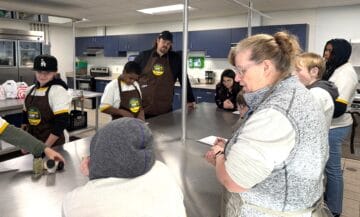 From the football field to the kitchen
From the football field to the kitchen


